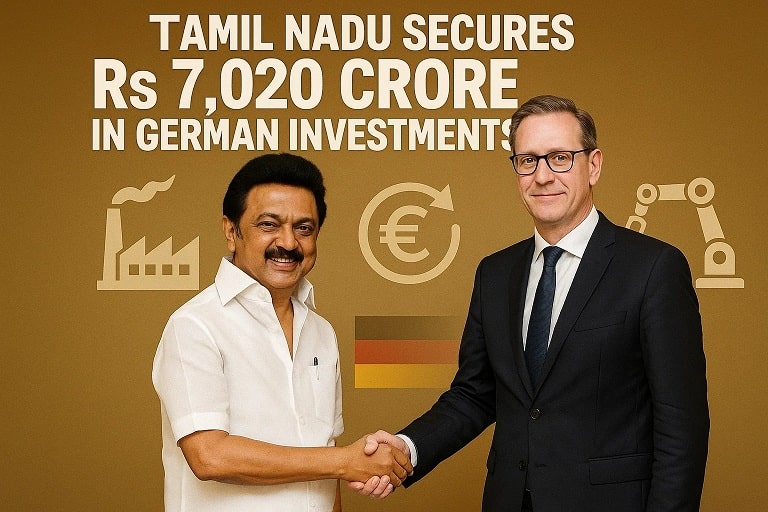Tamil Nadu Secures Rs 7,020 Crore in German Investments: A Strategic Leap Toward Industrial Dominance
Tamil Nadu has solidified its position as a global investment hub by securing 26 Memoranda of Understanding (MoUs) worth Rs 7,020 crore during Chief Minister M.K. Stalin’s week-long visit to Germany, concluding on September 2, 2025. These agreements, signed with leading German firms at the TNRising Germany Investment Conclave, are set to generate over 15,320 jobs across diverse sectors, reinforcing the state’s ambition to become a $1 trillion economy by 2030. This landmark achievement highlights Tamil Nadu’s robust industrial ecosystem, skilled workforce, and business-friendly policies, positioning it as India’s industrial powerhouse akin to Germany’s role in Europe. This article explores the catalysts behind this investment surge, historical context, future prospects, and the transformative impacts on Tamil Nadu’s economy and global standing.
Why This Investment Surge Matters
The Rs 7,020 crore influx from German companies underscores Tamil Nadu’s growing appeal as a destination for advanced manufacturing, renewable energy, and technology. With over 60 German firms already operating in the state—including giants like BMW, Siemens, and Bosch—these new commitments signal confidence in its infrastructure and governance. For global business leaders, this development opens avenues for partnerships in high-growth sectors, while policymakers see it as a step toward economic resilience amid global trade challenges, such as looming US tariffs projected to cost Tamil Nadu $3.93 billion in exports by FY26.
Latest Economic Events Leading to the Investment
The TNRising Germany Investment Conclave, held in Düsseldorf, was the centerpiece of CM Stalin’s visit, where 23 MoUs worth Rs 3,819 crore were signed, promising 9,070 jobs. Combined with three earlier agreements worth Rs 3,201 crore, the total investment reached Rs 7,020 crore. Key players like Knorr-Bremse, Nordex Group, and ebm-papst led the charge, with additional commitments from Vensys Energy, BASF, and others. Stalin’s engagements with BMW executives further emphasized Tamil Nadu’s EV ecosystem, with discussions on expanding the company’s Chennai plant for electric vehicle production.
Key Investment Highlights
- Knorr-Bremse: The Munich-based braking systems leader committed Rs 2,000 crore for a state-of-the-art facility focused on railway doors and braking systems, marking its first major manufacturing venture in Tamil Nadu. This project is expected to create 3,500 jobs.
- Nordex Group: The Hamburg-based wind turbine manufacturer pledged Rs 1,000 crore to expand its Tamil Nadu operations, generating 2,500 jobs and bolstering the state’s renewable energy leadership.
- ebm-papst: This energy-efficient motor specialist announced a Rs 201 crore expansion of its Global Capability Centre (GCC) and manufacturing base, creating 250 high-skill jobs over five years.
- Vensys Energy: A Rs 1,068 crore investment for a wind components facility, expected to create 5,238 jobs, further strengthens Tamil Nadu’s green energy profile.
-
Other Commitments: BASF, Bella Premier Happy Hygiene, Herrenknecht India, and others contributed Rs 1,751 crore, focusing on catalysts, sanitary products, and industrial equipment, adding over 2,750 jobs.
Context of the Visit
Stalin’s Germany tour, part of a broader two-nation trip including the UK, built on his earlier 2024 US visit, which secured Rs 7,616 crore in investments. Addressing the Tamil diaspora in Cologne, he urged contributions to the state’s growth, emphasizing its 9.69 percent GDP growth in 2024-25—the highest among Indian states. The conclave highlighted Tamil Nadu’s urbanized economy, with the largest number of factories and industrial workers nationwide, making it a magnet for global investors.
Historical Context of Tamil Nadu’s Investment Journey
Tamil Nadu’s emergence as an industrial hub traces back to its early adoption of business-friendly policies and infrastructure development. The state has hosted German companies since the 1990s, with BMW establishing its Chennai plant in 2007. Recent years have seen accelerated foreign direct investment (FDI) through strategic outreach.
Key Milestones in Investment Attraction
- 2019-2021: Global Investors Meet (GIM) 2019 secured Rs 3 lakh crore in commitments, setting the stage for Tamil Nadu’s trillion-dollar vision.
- 2022-2023: Visits to UAE, Singapore, and Japan yielded Rs 7,442 crore in MoUs, creating over 17,000 jobs.
- 2024: GIM 2024 garnered Rs 6.64 lakh crore, with major deals from VinFast (Rs 16,000 crore) and Tata Motors (Rs 9,000 crore), targeting 26 lakh jobs.
- 2025: The Germany visit adds Rs 7,020 crore, reinforcing Tamil Nadu’s appeal amid global supply chain shifts.
This trajectory reflects Tamil Nadu’s proactive approach, leveraging its Dravidian Model of governance to blend economic growth with social equity, positioning it as “India’s Germany.”
Future Scopes and Projections
The Rs 7,020 crore investment is a springboard for Tamil Nadu’s industrial ambitions, with projections suggesting a 10 percent annual FDI growth rate through 2030. The state aims to deepen its EV and renewable energy ecosystems, targeting a 30 percent share in India’s clean energy production. By 2028, these investments could contribute Rs 20,000 crore to the state’s GDP and create ancillary jobs in logistics and services.
Long-Term Strategic Outlook
Tamil Nadu’s vision includes scaling up advanced manufacturing, with plans for a dedicated EV hub in Chennai and green energy corridors in Coimbatore. Collaborations with German firms could lead to technology transfers in AI-driven automation and sustainable materials, positioning the state as a global leader in green industrialization.
Potential Challenges
Geopolitical risks, such as US tariffs impacting $1.62 billion in textile exports, pose challenges. Additionally, sustaining power infrastructure requires Rs 2 lakh crore over seven years to decarbonize the grid, necessitating financial reforms for power distribution companies. Competition from states like Gujarat could also divert some investments.
Impacts on Tamil Nadu’s Economy and Stakeholders
These investments are poised to transform Tamil Nadu’s economic landscape, enhancing its global reputation and creating a multiplier effect across sectors. The job creation—15,320 direct roles—will stimulate local economies, while technology transfers elevate skill levels, aligning with the state’s goal of a $1 trillion economy.
Sector-Wise Impacts
Automotive and Electric Vehicles (EVs)
- Impact: Discussions with BMW signal potential expansion of its Chennai plant, strengthening Tamil Nadu’s EV ecosystem. The state’s robust infrastructure, including charging networks and policy incentives, could attract further investments from global automakers, potentially adding 5,000 jobs by 2028.
- Economic Contribution: The automotive sector could contribute Rs 10,000 crore annually to GDP, with Tamil Nadu emerging as a hub for EV components and assembly.
- Business Opportunities: SMEs in auto parts and battery manufacturing will benefit from supply chain integration, while startups may access German R&D expertise.
Renewable Energy
- Impact: Investments from Nordex Group and Vensys Energy solidify Tamil Nadu’s leadership in wind energy, with new facilities expected to produce turbines for domestic and export markets. This could reduce reliance on fossil fuels by 15 percent in the state by 2030.
- Economic Contribution: The renewable sector may add Rs 5,000 crore to the economy, with 7,738 jobs from Vensys and Nordex boosting rural employment.
- Business Opportunities: Local firms in solar and wind component manufacturing will see demand spikes, while green energy startups may attract EU funding.
Railway Components and Advanced Engineering
- Impact: Knorr-Bremse’s Rs 2,000 crore facility will establish Tamil Nadu as a rail component hub, supporting India’s railway modernization. The 3,500 jobs created will include high-skill engineering roles, enhancing workforce capabilities.
- Economic Contribution: The rail sector could generate Rs 3,000 crore annually, with exports to Europe and Asia rising by 10 percent.
- Business Opportunities: Engineering firms will benefit from subcontracting, while training institutes may partner with Knorr-Bremse for skill development programs.
Industrial Equipment and HVAC
- Impact: ebm-papst’s Rs 201 crore expansion in HVAC and automotive applications will create 250 specialized jobs, fostering innovation in energy-efficient technologies. This aligns with Tamil Nadu’s carbon-neutral goals by 2035.
- Economic Contribution: The sector could add Rs 500 crore to GDP, with indirect jobs in logistics and maintenance.
- Business Opportunities: Local manufacturers of motors and cooling systems will see increased orders, while tech firms may collaborate on smart HVAC solutions.
Chemical and Sanitary Products
- Impact: BASF’s Rs 300 crore investment in catalysts and battery materials, alongside Bella Premier Happy Hygiene’s Rs 300 crore sanitary product facility, will enhance Tamil Nadu’s chemical and consumer goods sectors, creating 300 jobs.
- Economic Contribution: These projects could contribute Rs 1,000 crore, with exports to Southeast Asia growing by 5 percent.
- Business Opportunities: Chemical startups and FMCG distributors will gain from supply chain linkages, while women’s employment in sanitary product manufacturing rises.
Investment Breakdown by Key Players
|
Company |
Investment (Rs Crore) |
Jobs Created |
Sector Focus |
|---|---|---|---|
|
Knorr-Bremse |
2,000 | 3,500 |
Railway components |
|
Nordex Group |
1,000 | 2,500 |
Renewable energy (wind turbines) |
|
Vensys Energy |
1,068 | 5,238 |
Wind components |
|
ebm-papst |
201 | 250 |
HVAC, automotive motors |
|
BASF |
300 | 100 |
Catalysts, battery materials |
|
Bella Hygiene |
300 | 200 |
Sanitary products |
|
Herrenknecht India |
250 | 400 |
Industrial equipment |
This table illustrates the diversity and scale of investments, with a focus on high-impact sectors.
Frequently Asked Questions (FAQs)
What drove Tamil Nadu’s success in securing Rs 7,020 crore from Germany?
The state’s robust EV infrastructure, skilled workforce, and proactive policies, showcased at the TNRising Germany Investment Conclave, attracted global firms like Knorr-Bremse and Nordex.
Which sectors are benefiting most from these investments?
Renewable energy, railway components, automotive, HVAC, and chemical industries are key beneficiaries, with significant job creation and technology transfers.
How will these investments impact Tamil Nadu’s economy?
They will create 15,320 jobs, boost GDP by Rs 20,000 crore by 2028, and enhance global supply chain integration.
What challenges could affect these investments?
US tariffs, power sector funding needs, and competition from other states may pose hurdles, though Tamil Nadu’s infrastructure mitigates risks.
How does this fit into Tamil Nadu’s broader economic goals?
The investments align with the state’s $1 trillion economy target by 2030, strengthening its position as India’s industrial and innovation hub.




















